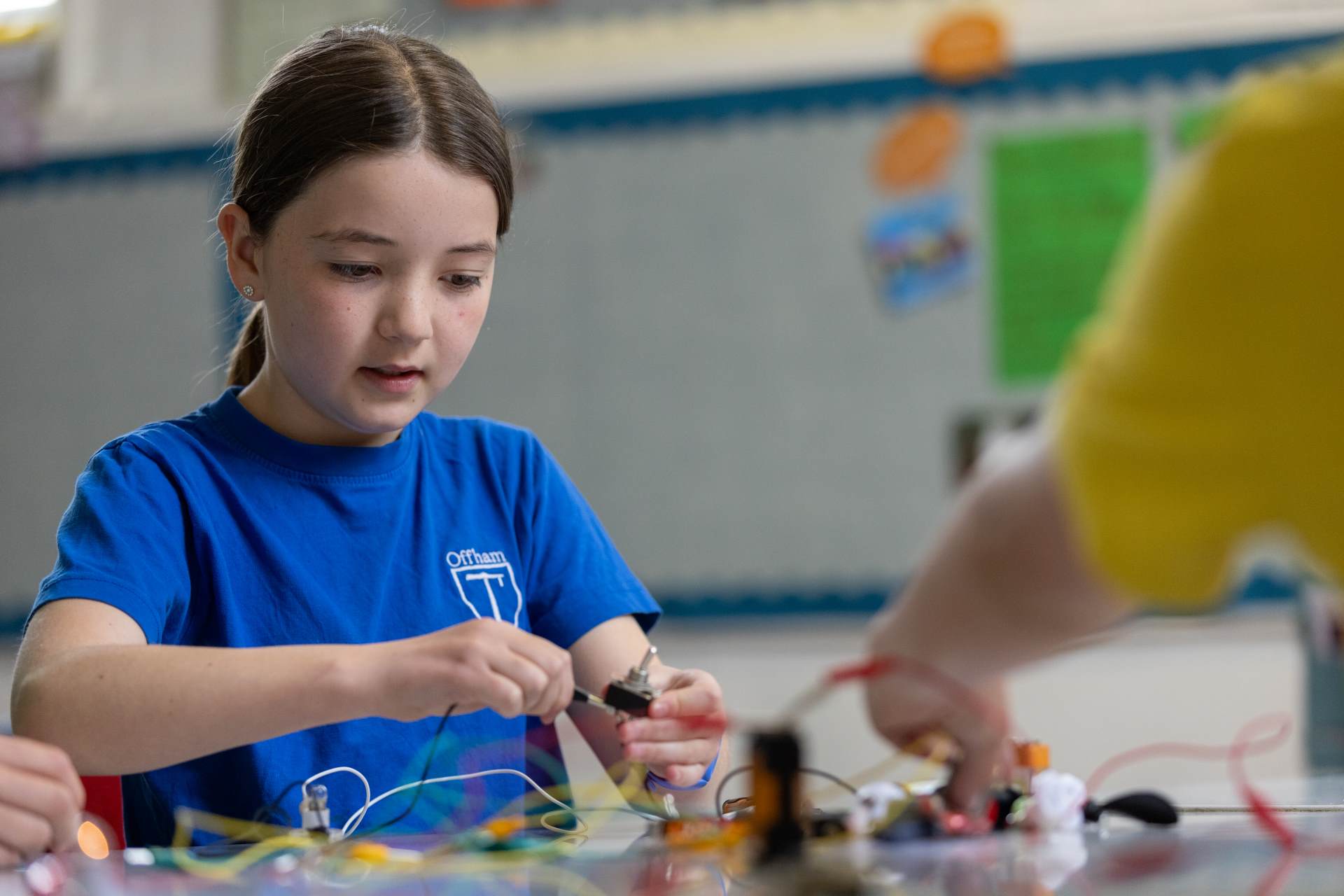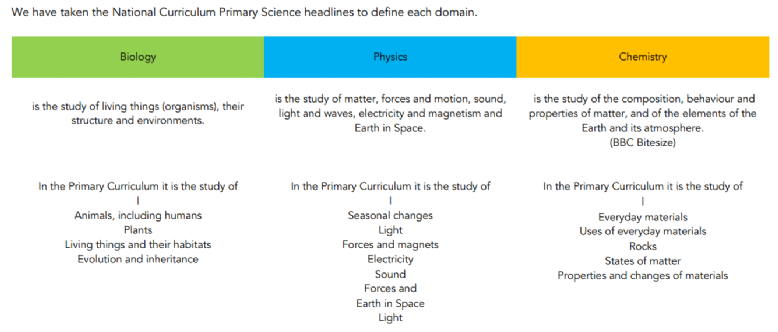Science

At Offham Primary School, we recognise the importance of Science in every aspect of daily life; we encourage children to be inquisitive throughout their time at our school and beyond. The Science curriculum fosters a natural curiosity of the child, encourages respect for living organisms and the physical environment and provides opportunities for critical evaluation of evidence. We believe that science encompasses the acquisition of knowledge, concept, skills and positive attitudes.
At Offham, Science is taught across each year group in modules that enable pupils to study in-depth key scientific understanding, skills, and vocabulary. Each module aims to activate and build upon prior learning, including EYFS, to ensure better cognition and retention. Each module is carefully sequenced to enable pupils to purposefully layer learning from previous sessions to facilitate the acquisition and retention of key scientific knowledge. Each module is revisited either later in the year or in the following year as part of a spaced retrieval practice method to ensure pupils retain key knowledge and information.
We use CUSP Science as to guide our teaching and learning of science in all year groups. CUSP Science pays close attention to guidance provided by the National Curriculum sequence and content. It is infused with evidence-led practice and enriched with retrieval studies to ensure long-term retention of foundational knowledge. The foundations of CUSP science are cemented in the EYFS through learning within the Natural World, and People, Culture and Communities.

What Pupils Will Know
Substantive knowledge - this is the subject knowledge and explicit vocabulary used to learn about the content. Common misconceptions are explicitly revealed as non-examples and positioned against known and accurate content.
In CUSP Science, an extensive and connected knowledge base is constructed so that pupils can use these foundations and integrate it with what they already know. Misconceptions are challenged carefully and in the context of the substantive and disciplinary knowledge. In CUSP Science, it is recommended that misconceptions are not introduced too early, as pupils need to construct a mental model in which to position that new knowledge.
What Pupils Will Do
Disciplinary knowledge – this is knowing how to collect, use, interpret, understand and evaluate the evidence from scientific processes. This is taught. It is not assumed that pupils will acquire these skills by luck or hope. Pupils construct understanding by applying substantive knowledge to questioning and planning, observing, performing a range of tests, accurately measuring, comparing through identifying and classifying, using observations and gathering data to help answer questions, explaining and reporting, predicting, concluding, improving, and seeking patterns.
CUSP call it ‘Working Scientifically.’ CUSP Science provides Working Scientifically coverage maps to check the balance of provision in KS1, Lower and Upper KS2. They are also present in the Whole Class Assessment toolkits.
Scientific analysis is developed through IPROF criteria. We call it ‘Thinking Scientifically.’
- identifying and classifying
- pattern seeking
- research
- observing over time
- fair and comparative testing
Substantive concepts include concrete examples, such as ‘plant’ or more abstract ideas, such as ‘biodiversity’. Concepts are taught through explicit vocabulary instruction as well as through the direct content and context of the study.
EYFS - Year 6 Science Progression
Principles
A guiding principle of CUSP Science is that each study draws upon prior learning. For example, in the EYFS, pupils may learn about The Natural World through daily activities and exploring their locality and immediate environment. This is revisited and positioned so that new and potentially abstract content in Year 1, such as Animals, including humans, is related to what children already know. This makes it easier to cognitively process. This helps to accelerate new learning as children integrate prior understanding.
CUSP Science is organised into three distinct subject domains: biology, physics and chemistry. Where inter-disciplinary concepts are encountered, such as the particle model, these are taught explicitly and connected across science domains.
CUSP Science has sequenced the national curriculum into meaningful and connected ‘chunks’ of content to reduce the load on the working memory as well as creating coherent and strong long-term memories. The sequence of substantive and disciplinary knowledge enables pupils to become ‘more expert’ with each study and grow an ever broadening and coherent mental model of the subject. This guards against superficial, disconnected and fragmented scientific knowledge and weak disciplinary knowledge. High frequency, multiple meaning words (Tier 2) are taught explicitly and help make sense of subject specific words (Tier 3).
Each learning module in CUSP Science has a vocabulary module with teacher guidance, tasks and resources to enhance and deepen understanding. CUSP Science is planned so that the retention of knowledge is much more than just ‘in the moment knowledge’. The cumulative nature of the curriculum is made memorable by the implementation of Bjork’s desirable difficulties, including retrieval and spaced retrieval practice, word building and deliberate practice tasks.
This powerful interrelationship between structure and research-led practice is designed to increase substantive knowledge and accelerate learning within and between study modules. That means the foundational knowledge of the curriculum is positioned to ease the load on the working memory: new content is connected to prior learning. The effect of this cumulative model supports opportunities for children to associate and connect significant scientific concepts, over time, and with increasing expertise and knowledge.
CUSP Science deliberately pays attention and values the importance of subject content as well as the context it is taught in. Common scientific misconceptions are identified in all CUSP Science learning modules. These misconceptions are made explicit to pupils. Children draw upon substantive and disciplinary knowledge to reason and practise acquiring the conception, whilst repelling the misconceptions. Examples and non-examples are powerful ways of saying what something is and what something isn’t.
CUSP Science values the study of scientists from the past as well as promoting diverse present-day role models in the field. These studies help us to learn how they used, at that time, their substantive and disciplinary knowledge to develop a conception. This illuminates how misconceptions can permeate substantive knowledge and appear to be a known truth. An example of this is the study of Maria Merion in Year 5, who was born in Germany in 1667. She observed and drew insects going through biochemical metamorphosis. She challenged the misconception that all insects were evil, born from mud and were the work of the devil. Further examples of contextual misconceptions and refinement of conceptions can be seen in the study of Galen’s views about blood circulation in AD 157 and William Harvey’s findings in 1602.
CUSP fulfils and goes well beyond the expectations of the National Curriculum. CUSP science was the right choice for Offham Primary School, as we believe there is no ceiling to what pupils can learn if the architecture and practice is founded in evidence-led principles.

